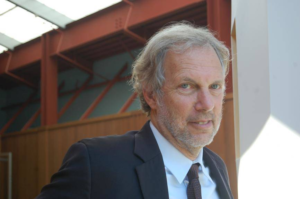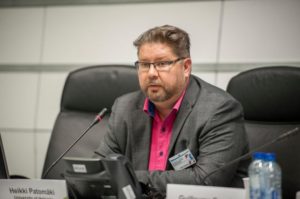Noam Chomsky & Robert Pollin: Humanity’s Fate Isn’t Sealed — If We Act Now
We live in extraordinarily dangerous times. Climate breakdown is upon us, yet nation-states and their leaders continue to pursue policies based on “national security” and the pursuit of geopolitical objectives. The transition to a clean and sustainable global energy landscape is hampered both by powerful interests linked to the fossil fuel economy and lack of international cooperation. In fact, the war in Ukraine, which runs on fossil fuels, is not only delaying climate action but has increased reliance on the very energy sources that drive global warming and poison the planet. Indeed, the war has been a godsend to the fossil fuel industry. “Drill, baby, drill” is back with a vengeance, and oil and gas companies are reaping unprecedented profits as families everywhere are struggling with skyrocketing energy costs.
To be sure, “savage capitalism,” as Noam Chomsky powerfully remarks in this exclusive joint interview with economist Robert Pollin, is unleashed today even more destructively than it has in the past. Yet, as Pollin so astutely points out, there are ways to tame global warming and make a successful transition to a sustainable future based on clean energy systems (which do not include nuclear power plants or so-called negative emission technologies). In fact, Chomsky and Pollin agree that, in large part, it is political will that stands in the way of securing the future of humanity and the planet. As Chomsky notes, the task of political education in the age of global warming is analogous to the task of philosophy as described by Ludwig Wittgenstein: “to show the fly the way out of the fly-bottle.”
Noam Chomsky is institute professor emeritus in the department of linguistics and philosophy at MIT and laureate professor of linguistics and Agnese Nelms Haury Chair in the Program in Environmental and Social Justice at the University of Arizona. One of the world’s most cited scholars in modern history and a critical public intellectual regarded by millions of people as a national and international treasure, Chomsky has published more than 150 books in linguistics, political and social thought, political economy, media studies, U.S. foreign policy and world affairs, and climate change.
Robert Pollin is distinguished professor of economics and co-director of the Political Economy Research Institute (PERI) at the University of Massachusetts-Amherst. One of the world’s leading progressive economists, Pollin has published scores of books and academic articles on jobs and macroeconomics, labor markets, wages, and poverty, environmental and energy economics. He was selected by Foreign Policy Magazine as one of the “100 Leading Global Thinkers for 2013.” Chomsky and Pollin are co-authors of Climate Crisis and the Global Green New Deal: The Political Economy of Saving the Planet (2020).
C. J. Polychroniou: Noam, the systemic impacts of the war in Ukraine are enormous and they include economic shocks, food and energy security, geopolitical dimensions, and climate change. With regard to the latter, while it is difficult to make an accurate estimate of the climate impact of the war in Ukraine, it is crystal clear that it hinders current efforts to curb global warming and may even alter long-term strategy on climate action and action plan. How exactly are the war in Ukraine and the climate crisis connected, and why are governments doubling down on coal, oil and gas instead of doubling down on the clean energy transition?
Noam Chomsky: An independent observer looking at the world today might well conclude that it is being run by the fossil fuel and military industries, or by lunatics. Or both.
The scientific literature is harrowing, regularly showing that earlier dire warnings were too conservative and that we are careening towards disaster at a frightening pace. Even without reading the literature, anyone with eyes open can see that nature is saying “enough”: extreme heat, huge floods, devastating drought and severe water crises, large regions of the earth approaching the point where they will soon be uninhabitable.
How are we reacting? The basic character is captured by a clip from the marvelous satirical journal Onion — except that it is perhaps even beyond their imagination. It is real. And reported, with disbelief, in the mainstream:
‘In a paradox worthy of Kafka, ConocoPhillips plans to install “chillers” into the permafrost — which is thawing fast because of climate change — to keep it solid enough to drill for oil, the burning of which will continue to worsen ice melt.’
In his bitter antiwar essays, Mark Twain wielded his formidable weapon of satire against the perpetrators. But when he reached the renowned General Funston, he threw up his hands in despair: “No satire of Funston could reach perfection,” Twain lamented, “because Funston occupies that summit himself…. [He is] satire incarnated.”
What is happening before our eyes is unleashed savage capitalism as satire incarnated. Even Twain would be silenced.
To see what is at stake, consider some basic facts. “Arctic permafrost stores nearly 1,700 billion metric tons of frozen and thawing carbon. Anthropogenic warming threatens to release an unknown quantity of this carbon to the atmosphere.… Carbon dioxide emissions are proportionally larger than other greenhouse gas emissions in the Arctic, but expansion of anoxic conditions within thawed permafrost and soils stands to increase the proportion of future methane emissions. Increasingly frequent wildfires in the Arctic will also lead to a notable but unpredictable carbon flux.”
The carbon flux may be unpredictable in detail, but the resulting devastation is all too predictable in its general outline. How then does unleashed savage capitalism respond? Simple. Let’s employ our best brains to find ways to slow the melting down a little so that we can pour more poisons into the atmosphere for profit, and as a side effect, release those Arctic permafrost stores into the atmosphere more rapidly so as to make life unlivable.
Unfortunately, the observation generalizes. We find satire incarnate wherever we turn, even in marginal corners. Thus, one argument against solar energy is land use. A real problem, especially in the U.K., where golf courses take up over four times as much space as solar power, so we learn from political economist Adam Tooze’s invaluable Chartbook.
Satire incarnate is just the cutting edge. It brings out dramatically the elements of dominant economic institutions that are lethal if unleashed. It would be hard to conjure up a more fitting epitaph for the species — or more accurately, for the institutions that have become dominant as what we call civilization marches forward. Read more
Is Globalization Responsible For Climate Change? An Interview With Graciela Chichilnisky And Helena Norberg-Hodge
What is the connection between economic globalization and climate change? Is globalization reversible? Can climate change be reversed? If so, how? In the interview that follows, two leading voices in the struggle for a safe planet and a sustainable future, Graciela Chichilnisky and Helena Norberg-Hodge, address these questions from their own unique perspectives and offer critical insights on how we can avert a climate change catastrophe.
A world renowned economist and mathematician, Graciela Chichilnisky is the architect of the Kyoto Protocol carbon market and cofounder and CEO of Global Thermostat, a disruptive, carbon negative technology company based in the Silicon Valley that removes carbon dioxide from the air. She is Professor of Economics and of Statistics at Columbia University and Visiting Professor of Economics at Stanford University. Helena Norberg-Hodge is the founder and director of Local Futures, a pioneer of the “new economics” movement. She is the producer and co-director of the award winning documentary “The Economics of Happiness” and recipient of the Goi Peace Award.
J. Polychroniou and Marcus Rolle: Climate change is the most daunting problem facing humanity today, and globalization seems to be accelerating it. In fact, the effects of climate change are moving faster than predicted as free trade agreements are proliferating, multinational corporations move their operations to developing countries in order to avoid stricter environmental rules at the home country, and export-oriented industrial agriculture has replaced local farming. Do you agree with the view that economic globalization bears responsibility for climate change?
Helena Norberg-Hodge: Absolutely. Globalization – or the deregulation of global trade and finance – has direct consequences for the climate. It promotes unnecessary long-distance transportation of goods, rampant consumerism, biological monocultures, energy-intensive technology use, and mass urbanization – which leads to ever-increasing fossil fuel consumption. It is also worth noting that a 2013 study found that two-thirds of the fossil fuels that have been burned over the last 150 years were burned by just 90 corporate entities, including companies such as Texaco and ExxonMobil.
With the help of corporate-funded think-tanks, there is a commonly-held belief that individual citizens’ consumption patterns, rather than the systemic changes in production because of globalization are to blame for climate change. This is a very narrow framing of the climate crisis, but it’s one that has gained a lot of credence in the media due to the support of Al Gore and others. Meanwhile, it’s becoming increasingly clear every day that there are inherent and predictable connections between the deregulation of transnational corporations and the climate crisis. And people are beginning to notice those connections.
So reversing the trend towards further globalization needs to be central to the climate movement.
Graciela Chichilnisky: Yes: globalization was led by the Breton Woods institutions that were founded after WWII to encourage and enforce a pattern of international trade duplicating colonialism at a global scale: deep and extensive extraction of resources from developing nations that were exported at low prices for consumption in industrial nations. This pattern of international trade can be seen as a global tragedy of the commons, since developing nations lack property rights on extractive resources and their governments are dependent of international organizations and therefore “permeable” This term was introduced by Natasha Chichilnisky-Heal who documented the “permeability” of governments in developing nations that are rich in extractive resources in the cases of Mongolia and Zambia, with examples on the direct role of the World Bank in the case of Rio Tinto and Mongolia’s copper mines, the largest in the world. Read more
Is Malfunctioning US Democracy Responsible For Climate Change? An Interview With Graciela Chichilnisky And Heikki Patomaki
As the climate change crisis continues unabated, it is becoming increasingly clear that the absence of global governance is a major factor in our failure to take necessary action for protecting the future of the planet. But an equally significant factor behind this failure is the dysfunctional state of the American political system as the global superpower’s elected officials continue to deny the global warming phenomenon and to insist on a business as usual approach vis a vis the environment in general and climate change in particular — in spite of the fact that the majority of the American people have a different view on the matter.
To what extent is the absence of global governance and the malfunctioning US democracy responsible for climate change? What will it take to turn things around and rescue humanity from an unmitigated disaster of its own making? Can technology provide a way out? These issues are debated below in a joined interview with two leading scholars: Graciela Chichilnisky, a world renowned economist and mathematician, Professor of Economics and of Statistics at Columbia University and Visiting Professor of Economics at Stanford University), and a leading force in the climate change battle (architect and author of the Kyoto Protocol Carbon Market, CEO and cofounder of Global Thermostat), and Heikki Patomaki, Professor of World Politics at the University of Helsinki, Finland, and a leading authority in the field of global governance.
J. Polychroniou and Marcus Rolle: Climate change has emerged in early 21st century as the most critical global problem, although there still continues to be plenty of denial and inexcusable political inertia across the globe. In this context, to what extent is the difficulty of addressing climate change a problem related to the absence of global governance?
Heikki Patomaki: Global governance in this field is not entirely absent, as witnessed by the Kyoto Protocol and Paris Agreement, but it is seriously lacking in many important ways. A key reason for why proper global governance – or government – is needed is that individual state-actions and world markets are often poor in preventing unnecessary, unneeded and unwanted worldwide developments from happening. World markets and separate states may generate economic crises and downturns or global warming or other unsustainable developments. Without legitimate and well-functioning common institutions it is also difficult to take action against underdevelopment, uneven industrialization or growth, or global accumulation of privileges and power – all of which may also be self-reinforcing processes in the absence of proper countervailing responses. Moreover, these processes can also trigger and strengthen conflicts among states, which may lead to securitization, even to arms-race and wars.
We can talk about reflexive self-regulation when knowledge about the way the social systems – including the world system as a whole – function is applied recursively in interventions that aim at avoiding unwanted or achieving desired outcomes. But what is unwanted or desirable is always an ethico-political question. Not only are different anticipations about the possible and likely futures involved in the politics of climate change, but so are assumptions concerning justice or the extent to which either actual or administratively created simulated markets can regulate themselves.
Graciela Chichilnisky: Globalization emerged after World War II fostered by the Bretton Woods Institutions that were created in 1945: The World Bank, the IMF, the WTO. They provided governance of the world economy for the first time in history. The United Nations and its various organizations emerged in that same period, and offered diplomatic and political governance. But by their own design, the Bretton Woods institutions shaped the world economy, and, also by design, they were dominated by the United States, which emerged as the sole economic power after the destruction caused by WWII. It is not surprising, therefore, that the main obstacle for the global governance of climate change originates in the USA — in particular in the US Congress, which seems to be out of step with the American people. Economics, indeed industrialization as fostered by the Bretton Woods institutions and the USA as the chief supporter, is deeply anchored at the source of climate change. The Bretton Woods organizations enforced an economic model based on industrialization with deep and extensive overuse of natural resources of all types and particularly of fossil fuels as a source of energy. The world’s resources were extracted by developing nations and exported at low prices and overconsumed in the industrial nations. Climate change is a physical fact, but its origins are economic. There is nothing that can be done about climate unless we change our prevailing economic models and institutions including the overuse of global resources such as water, air, biodiversity, and fossil fuels. These are the economic factors at the source of the problem: the governance of the world economy we have is forcefully imposing a pattern of economic growth – and defining economic progress – in a way that may have been possible a hundred years ago but is no longer feasible now. Economic progress as defined by the Bretton Woods institutions will in all likelihood lead to catastrophic climate change and even to the extinction of the human species, destroying globally the sources of clean air, drinkable water, biodiversity, and a stable climate that are our basic needs for survival. We need to change the global governance of the world economy for our species to survive. The United Nations governance is anchored on the concept of nation states –it uses a “one nation one vote” principle, while the Bretton Woods institutions use “one dollar one vote”, governance is determined by the dollar amount that a nation controls. Nation states are a relatively new concept in human history, and there is nothing that a single nation can do by itself to avoid the worst outcomes of climate change which is a global phenomenon, since CO2 concentration is the same everywhere in the planet, whether it is measured in New York, in Beijing, in Madrid or in Buenos Aires it is always the same. Each continent has enough fossil fuels to cause climate change by itself, affecting the entire world, Africa could cause trillions of dollars in losses to the USA, for example, just by burning its own coal. The issue is global and cannot be resolved by any single nation: it is truly a global issue and our global governing institutions are not appropriate for the challenge. Lord Nicholas Stern said that Climate Change is “the biggest externality in the history of humankind” and yet our economic governing institutions are based on markets for private goods that completely disregard externalities. We need new global governing institutions and a new economic discipline focused on internalizing externalities in order to face the climate challenge. This is the global carbon market I designed and wrote into the Kyoto Protocol achieves for the atmosphere. Traditional economics with private goods and private markets, with governing institutions based on nation states and private market values do not make the cut.
Read more
There Is A Solution To Climate Change ~ And It Is Carbon Negative Technology
 Climate change poses the greatest threat to human civilization as we know it. Yet, governments around the world are reluctant to take drastic action to avert a climate change catastrophe even though we have the means to do so, as I will point out in the latter part of this essay.
Climate change poses the greatest threat to human civilization as we know it. Yet, governments around the world are reluctant to take drastic action to avert a climate change catastrophe even though we have the means to do so, as I will point out in the latter part of this essay.
But let’s take things from the start and look at the latest attempt of the part of the world’s governments to redress the problem of climate change, i.e., the Paris Agreement of late 2015.
In contrast to the Kyoto Protocol, whose provisions run out in 2020, the Paris deal includes no legally binding carbon dioxide emissions limits. There are no mandatory emission limits and no mandatory payments to help poor nations develop clean energy technologies, nor to mitigate the damages caused by climate change on poor nations, when the damage was historically caused by the rich nations. Mandatory emissions limits are necessary for the carbon market to operate. What is traded in the carbon market is the right to exceed one’s mandatory limits. With no mandatory limits, there can be no carbon market. The entire world is clamoring for a “price on carbon”: this is the carbon market. The six largest oil and gas companies in the world publicly support a price on carbon (Including Shell, BP, Statoil, Total and Engie). Yet the Paris Agreement undermines the very foundation for a price on carbon by requiring no mandatory emission limits.
Why did the Paris climate change negotiations move away from mandatory targets on carbon emissions and adopted instead a voluntary approach to the climate change challenge? Because a legally binding treaty that needed ratification by governments back home would have reduced substantially the chances of reaching any kind of an agreement.
This is certainly the case for one of the world’s biggest polluters, i.e., the United States. Any treaty on climate change that made its way to Capitol Hill would be shredded into pieces by the Republican-controlled Congress.
However, as time goes by, it is certain that more and more people will realize that the political compromise made in Paris over mandatory emissions comes at a great cost. Our ability to control rising temperatures caused by carbon dioxide accumulated in the air is greatly hindered since voluntary agreements guarantee failure.
But there is more. As the latest Intergovernmental Panel on Climate Change report points out, carbon emission cuts are not enough to slow down global warming. According to IPCC, we are headed with certainty towards an increase in temperatures by three degrees Celsius by 2100, although there are scientists who believe that two degrees of warming is “a recipe for disaster.” It suffices to recall the superstorm Sandy that closed down New York City for weeks, with flooded subways, leaving entire neighbourhoods without electricity, no schools, no law enforcement, and automobiles floating in the streets of this proud city. Climate change means an increase in the frequency and severity of such climate events. This means three or four Superstorm Sandies every year in New York, and the city cannot survive such climate change.
In addition to reducing drastically emissions through mandatory limits and adopting clean energy systems, it is now imperative that we utilize negative carbon technologies to remove existing carbon dioxide from the air. This was required by the IPCC, the scientific foundation of the climate negotiations, in its November 2014 5th Assessment Report. We procrastinated too much and now we have to massively reduce the CO2 that is already in the atmosphere in addition to reducing emissions. There are carbon negative technologies in Silicon Valley, like those employed by Global Thermostat, that are operating at SRI in Menlo Park California, which can offer a solution to the greatest threat facing the future of human civilization as we know it. This requires that we accept mandatory emission limits and reactivate the carbon market that is based on mandatory emissions, and was trading $175Bn/year by 2011.
The funding from the carbon market suffices to implement and scale up carbon removal around the world, as the IPCC requires, for example through carbon negative carbon plants that clean the atmosphere while they produce electricity- and do all of this in a low cost and profitable fashion. A proposal made by the author in Copenhagen COP15 was to use the Kyoto carbon market to offer finance to scale up globally such carbon negative carbon plants in poor nations, thus providing electricity that is needed by 1,3 Bn people around the world that currently have no access to electricity, all this while cleaning the planet’s atmosphere. This was called the Green Power Fund and required $200Bn/year for building carbon negative power plants; instead the Green Climate Fund was made into law, changing one word in its title and severing its connection from the source of funding, the carbon market of the Kyoto Protocol.
The reason the Climate Fund had its connection severed from its very source of funding, the carbon market of the Kyoto Protocol, was none other than the insistence of the US Congress – through its unanimously voted Byrd-Hagel Act — that there be no mandatory emissions limits.
But there is technology that can remove carbon from the atmosphere as required by IPCC. It is already operating in the Silicon Valley.
The carbon negative technologies in Silicon Valley, like those employed by Global Thermostat, which are fundamentally different from the now defunct carbon capturing and storing technologies, can offer a potential solution to the greatest threat facing the future of human civilization as we know it.
Such technologies, if employed on a global scale, can be used to clean the air from carbon dioxide, acting like trees do but much faster, as is needed now. Moreover, they are quite inexpensive and offer the potential of financial rewards, thus making them an attractive incentive to investors and enterpreneurs since, again, the logic of the global economy is not going to change overnight and we certainly cannot wait for the materialization of the “ideal society” for the planet and the future of human civilization to be saved.
At the same time, this is not to suggest that technology is magic. Technology does not exist in a vacuum nor can it be expected to be our robotic slave. We need to change today’s global financial institutions and the prevailing economic values as well. Economic values decide what is meant by economic progress. Today, economic values are based on short-sighted goals and on individualistic markets that defy logic, since they assign no value to clean air, to clean water or to biodiversity on which human survival depends. Assigning no value to the global commons–clean water, clean air, and biodiversity–leads to actions that threaten human survival. This has to change and can change. In the new Anthropocene era, humans are the most important geological force on the planet, and only with the right economic values can humankind survive.
Graciela Chichilnisky is Professor of Economics and of Statistics at Columbia University, Visiting Professor of Economics at Stanford University, Founder and CEO of Global Thermostat, and the architect of the Kyoto Protocol Carbon Market. www.chichilnisky.com
Climate Change: The Mother Of All Geopolitical Challenges ~ Interview With Graciela Chichilnisky
 In this interview, Graciela Chichilnisky, a world leading economist and one of the major climate change forces in our era, talks about the reality of climate change science, the reasons why some corporate interests continue to deny the facts about it, and explains why climate change may represent the greatest geopolitical challenge facing humanity.
In this interview, Graciela Chichilnisky, a world leading economist and one of the major climate change forces in our era, talks about the reality of climate change science, the reasons why some corporate interests continue to deny the facts about it, and explains why climate change may represent the greatest geopolitical challenge facing humanity.
Marcus Rolle: Despite the international scientific community’s consensus on climate change, there are still people who deny that climate change exists or that it is caused by human activity. In fact, some of those naysayers have been funded by corporate interests such as ExxonMobil, as revealed by Exxon’s former in-houses climate change expert Lenny Bernstein. However, the evidence for global warming is overwhelming. Why, specifically, are some corporate interests bent on hiding the truth about climate change, and what’s your opinion on the effects of global warming?
Graciela Chichilnisky: Some of the naysayers have been funded by corporate interests as was revealed by Lenny Bernstein, the in-house climate change expert of Exxon. Lenny fought me tooth and nail in Kyoto during December 1997, while I designed and then wrote the Carbon Market into the United Nations Kyoto Protocol. At the end the carbon market prevailed and is now international law, and ironically it is now advocated by six of the largest oil companies in the world and this includes ExxonMobil.
Corporate interests are far reaching and they can permeate the entire economy and the politics of a nation as a whole. In the case of fossil fuels the situation is compounded by the central role played by energy in the economy. Fossil fuels are all about energy, and energy is the mother of all markets. Everything is made with energy, your home, your car, your food and the computer on which this article is written and read. For this reason the right to use fossil fuels is very basic and it is close to land’s rights; as land’s rights, the rights to fossil fuels can be the cause of wars. It is all about values. Some say that the right to fossil fuels is about the right to use the earth’s resources, which were provided by God to humans, and they hold this as a human right whether or not burning fossil fuels can cause catastrophes and damage irrevocably the rest of the world.
Tackling climate change is like abolishing slavery. It is so deeply felt that it can cause wars. 150 years ago it was nearly obvious to everybody that slavery must disappear, because of basic human principles and of the most sophisticated arguments about freedom, civil rights and even economics. Yet 150 years ago the US fought a fratricide war that was the bloodiest in the nations’ history, and tore the nation apart to defend the right to own slaves. The South lost, but it nevertheless attempted to resuscitate the war many times despite that.
US historians say that the economic value that is at stake from abolishing fossil fuels is about the same as the value that was involved in eliminating slavery in the US 150 years ago. The abolition of fossil fuels can destroy today the largest balance sheets in the planet: these are the balance sheets of the largest oil companies. It is not surprising that emotions and economic interests of that size run amok and cloud reason.
MR: You have said that climate change is the mother of all geopolitical challenges. Can you elaborate a bit on this?
GC: Climate change is all about the use of fossil fuels: over two thirds of the world’s CO2 emissions that cause climate change come from burning fossil fuels to produce energy. Fossil fuel energy is today the basis of industrialization, and its use since WWII is what is causing climate change. The period since WWII is when the world economy globalized, where the North and the South wealth gap increased deeply and became three times larger what it was before, when abject poverty led over 1.3 billion people to live below the level of satisfaction of basic needs, and on the brink of survival. The Bretton Woods institutions were created after WWII: the IMF, the World Bank, the WTO, and they were dominated by the US that become nearly 60% of the world economy after the destruction of Germany and Japan. The Bretton Woods institutions used financial tools, denominated in US dollars, to encourage and coerce 80% of the planet’s population in the developing nations to follow a resource intensive form of economic development, leading to the over-extraction and exports of their fossil fuel resources and other important natural resources at the lowest prices ever – except perhaps for the prices we face today –and their overuse in rich nations. Fossil fuels are intimately connected with globalization – indeed they are the basis of the current wave of globalization. Fossil fuels are the basis of industrialization and they are traded through international markets: the international markets are dominated by rich nations, and these markets grew three times faster than the world economy as a whole since WWII. In these markets, poor nations that house 80% of the world population over-extract the earth’s resources within their territory for exports, and export them at prices that are lower than replacement costs, leading to sustained poverty, while rich nations who house 20% of the world’s population overuse the world’s resources and benefit from them at very low prices. This implacable process has led to a 3x increase in the world’s wealth gap between the poor South and the rich North since WWII. The image is just 20% of the world’s population siphoning and overusing the great majority of world’s resources. But the process has reached its natural limits: the increasing inequality between rich and poor nations in the world economy and the corresponding overexploitation of resources is the cause of the global environmental crisis of our times. It is threatening every nation in the world. Global environmental risks are worst for the poor nations, but every nation is at risk from the massive overuse of resources our lopsided economies and international trade policies of the Bretton Woods institutions caused. Climate change means the rise of the seas which has the same level all over the world. While the poor will suffer more, rich nations will suffer $trillions in economic losses, according to OECD reports in Paris, and will face massive immigration flows that will threaten their institutions, as the Pentagon anticipates. Read more
Climate Change And The Future Of The World: An Interview With Graciela Chichilnisky
In this highly insightful interview, climate change authority and leading economist Graciela Chichilnisky talks about the catastrophic threats that climate change pose to the future of the world if we fail to coordinate global actions aimed at the curbing of emissions and the removal of carbon dioxide from the air through the revolutionary technology available. Professor Chichilnisky also argues, however, that technology isn’t magic, and that what is required for tackling global warming with carbon negative technologies are fundamental changes in the way the global economy and its institutions have functioned in the post-war era.
Marcus Rolle: You have been for many years one of the leading forces in climate-change efforts. How do we define climate change?
Graciela Chichilnisky: Climate change means a major shift in climate patterns, such as dramatic increase in the violence, frequency, length, and severity of climate events, including superstorms, tornadoes, typhoons, major floods, and long severe droughts, as well as other climate related environmental disasters. These events increase both in intensity and frequency as energy in the atmosphere increases, which occurs when the mean temperature increases. Climate change also means dramatic changes in long term climate patterns such as desertification, the alteration or the reversal of major ocean currents, changes in the sea level, melting of the planet’s polar caps, and glacier periods.
MR: What evidence do you think supports the argument that climate change is taking place and that the global mean temperature is driven up by human interference?
GC: The statistical evidence conforms to the definition just provided: the planet’s polar caps are indeed melting, and the sea levels are indeed rising. This has been measured and is directly observed. We have increasingly violent, frequent, lengthy and severe climate events, major floods and unusual severe droughts that do not correspond statistically to standard deviations from the mean. Thousands of scientists from all over the world who report to the United Nations Intergovernmental Panel on Climate Change (IPCC) have come to the conclusion that changes in temperature are associated with changes in the concentration of greenhouse gases, of which the main one is CO2, and that mean temperature is increasing due, for the most part, to the burning of fossil fuels – coal, natural gas and petroleum -– for economic purposes: industrialization. Read more








